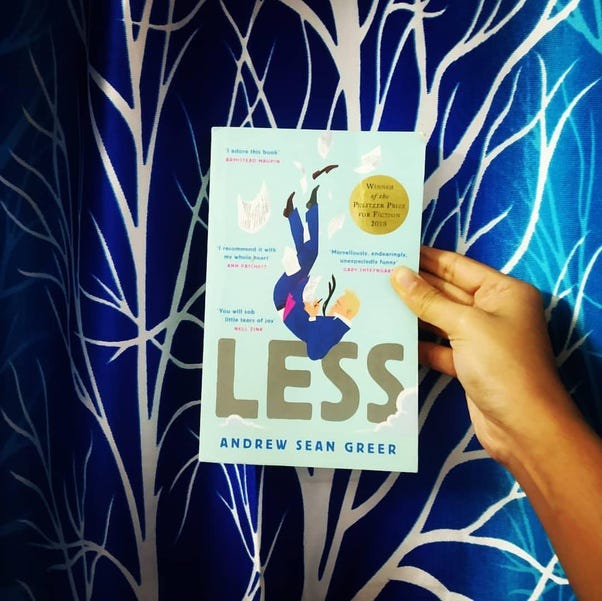Sometimes “Less” Is More
Andrew Sean Greer’s Pulitzer-winning satire touches the right nerves

Andrew Sean Greer’s Pulitzer-winning satire touches the right nerves
Andrew Sean Greer’s literary masterpiece introduces us to 50-year-old Arthur Less, “an author too old to be fresh and too young to be rediscovered, one who never sits next to anyone on a plane who has heard of his books”.
As a reader, starting a book about a novelist is always a risk. What if the writing is obnoxious and the plot all but a lazily disguised lesson in the author’s self-praise?
A couple of pages into Less and I knew this is not that novel.
There is a scene where Arthur Less is lamenting to his lesbian friend that his latest novel has been turned down by a publisher. “It was about a middle-aged gay man walking around San Francisco,” he says. “And, you know, his … his sorrows …”
“A white middle-aged American man walking around with his white middle-aged American sorrows?” his friend asks.
“Jesus, I guess so.”
“Arthur. Sorry to tell you this. It’s a little hard to feel sorry for a guy like that.”
“Even gay?
“Even gay.”
And that is where I knew the raw honesty of this book would have my heart.
The Premise
Arthur Less is lamenting how his best years slipped by, and he didn’t yet become the successful author he had hoped he would. To make matters worse, he is fast approaching his 50th birthday.
“Strange to be almost fifty, no? I feel like I just understood how to be young.”
“Yes! It’s like the last day in a foreign country. You finally figure out where to get coffee, and drinks, and a good steak. And then you have to leave. And you won’t ever be back.”
Less receives a wedding invitation from his ex-boyfriend, now engaged to someone else. He can’t say yes for fear of how awkward it would be. And, he can’t say no or it would look like defeat. So, Arthur Less picks the third option. On his desk are invitations to half-baked literary festivals from all over the world. He accepts them all.
Thus begins an around-the-world-in-eighty-days fantasia that takes Arthur Less on a journey where he discovers the best in him by confronting the worst he had been suppressing all along.
Arthur’s experiences in each city are described in Greer’s characteristic heart-warming prose. They throw light on the self-absorption of most people involved in the literary industry, and how some authors purposefully turn a blind eye on how irrelevant their work is to the lives of most people.
Arthur’s first stop is a talk show in New York, where he believes himself to be the chief guest. To his humiliation, he later finds out he was invited to chair the event for a wildly successful, albeit overrated, science fiction writer.
The journey takes Less next to Mexico, where some of his finest memories are rekindled. He had passed his youth as the lover of Robert, a celebrated poet. In the Mexican literary festival, he has to take part in a panel discussion about his former lover’s literary prowess.
The next stop is Italy, where Less is surprised to find that the translated version of his earlier novel is nominated for an obscure award. Thus begins a series of events that brilliantly captures the fake friendships and false modesty of literary rivals forced to be in the same room.
Less travels next to Germany, where he teaches a writing course titled ‘Read Like a Vampire, Write Like Frankenstein’. A fling with a besotted business student shows us some intimate details about the protagonist, and also drops in the first hints about who the narrator of Arthur’s story might be.
“He kisses — how do I explain it? Like someone in love. Like he has nothing to lose. Like someone who has just learned a foreign language and can use only the present tense and only the second person. Only now, only you.”
The next stops are Paris, Morocco, Japan, and India — a journey where he gets lost several times, but, in the end, finds himself.
The Writing
This is a mesmerising beauty of a book. I am left speechless and with the certainty that I am not done with the book yet — I will come back, and keep visiting Arthur Less as often as if he is a childhood friend I would rather die than lose contact with.
Here are a few of the most beautiful lines from the book:
“How can so many things become a bore by middle age — philosophy, radicalism, and other fast foods — but heartbreak keeps its sting?”
“So many people will do. But once you’ve actually been in love, you can’t live with “will do”; it’s worse than living with yourself.”
“I’ve got a theory. Now, hear me out. It’s that our lives are half comedy and half tragedy. And for some people, it just works out that the first entire half of their lives is tragedy and then the second half is comedy.”
“He knows the absurdity of asking someone to explain love or sorrow. You can’t point to it. It would be as futile, as unconveyable, as pointing at the sky and saying: that one, that star, there.”
Why You Should Read It
I loved the delicate portrayal of human emotions and sexuality, the seamless transition between a mundane, strikingly prosaic present and a rather rose-tinted, honeyed past: the love Less had for Robert that he was foolish enough to squander away on transitory pleasures, and the fire that burned in his heart for Freddy that he was naive enough to refuse to acknowledge. The reveal, in the end, is oddly satisfying, even though the reader had come to expect it more or less.
The story is simple, but the writing is breathtaking — it is as if the author takes the reader on a delightful journey across the globe with our bumbling, adorable and extremely likeable protagonist.
On his journey of trying to find the perfect place to escape his future and finish his novel, Less ends up finding his heart. And with him, we, the readers, discover that happiness is not bullshit, and that love is not overrated — that sometimes, being alone is just as fine.
Overall, this is a splendid book I would recommend to the lovers of literature — those hopeless souls that thirst for happy endings and believe that even in today’s miasmic world, love is possible; that love can be found, and that love transcends gender, race, and creed.
(Note: The links mentioned in this article are affiliate links. If you choose to purchase these books through these links, it will help me earn a small amount of money — at no extra cost to you. Thanks!)
More by Anangsha Alammyan on Books Are Our Superpower:


For book reviews and recommendations, follow me on Goodreads.
Join my email list to receive a thought-provoking story each week for FREE!
